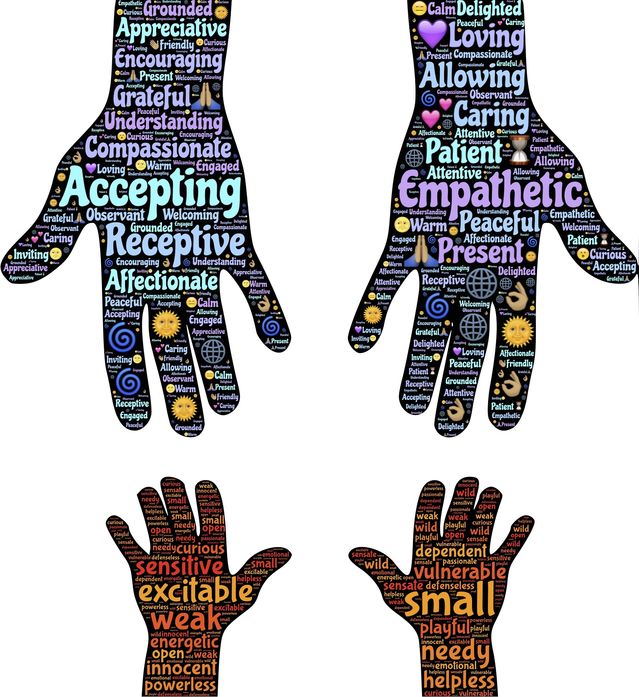
Parenting
You Parent the Way You Think
Four ways to manage parenting a child with mental illness
Posted December 27, 2017

Parenting a child with mental illness requires non-stop emotional work. Not only do parents manage sometimes scary behaviors from our children, we have to manage the fallout of those behaviors at school or at home. We have to manage siblings who may get bullied or ignored. We have to work harder to maintain our grown-up relationships. We manage everybody's emotional health, and in the midst of the chaos that is our lives, we forget to manage our own thoughts and feelings.
Get Parenting Help
My son's attention-deficit/hyperactivity disorder (ADHD) and disruptive mood dysregulation disorder (DMDD) have lead to everything from hospitalization to behavioral development programming to a special education classroom. He has plenty of intervention to manage his emotional and behavioral needs.
A few of these programs required parent engagement or had parenting support groups, and thank goodness for that. I had been contemplating regular therapy to manage the levels of stress and depression that come with this journey. It was easy to never follow up, though, due to lack of time or a tendency to direct energy elsewhere. Because my son's programing had it built in, though, I went.
Barriers may exist to parents taking part in programming. One thing I've learned is that, if you're not sure whether a resource exists, ask for it. Providers forget to mention these things sometimes, but there are financial and transportation resources for some programs if you need them.
Be Aware of How You Think
When a parent deals with a child's sometimes-dangerous behaviors, it's easy to go into autopilot. We don't stop to contemplate our sometimes deeply held, ingrained beliefs about ourselves and our children. Instead, we do what's necessary to survive and move on.
Our thoughts are important, though. I met a parent once in a support group who said things like, "Why is my child like this? What did we do wrong?" Her disappointment in her child was palpable. To her, her child was ruining her otherwise perfect family. She loved her son, of course. She was trying to help him and the family. Yet the defeat and hopelessness and blame was very clear in her eyes, even when he joined us later, and she gave him a hug.
I don't tell that story to judge that mother at all. Any parent of a child with mental illness has been in that dark place. It's an example, though, of thought processes that we may feel we're hiding from our children but probably affect how we treat them when we get stressed. Stress and anger are good at stripping us of our reason and revealing the deeper, baser parts of us.
Replace the Unhelpful Thoughts
No one's saying parents should think happy thoughts when we're not necessarily happy. I did some skills training once that was developed by a professor of psychiatry, Dr. Michael Bloomquist. (He in fact inspired the title of this post). He sought to identify helpful (versus unhelpful) thoughts. Some examples of unhelpful thoughts:
- My child is a brat.
- He does this on purpose.
- It's my fault he's this way.
Some examples of helpful thoughts:
- My child has positive behaviors, too.
- My child cannot always control his behaviors.
- My child is just a child. He still has things to learn.
If you can't muster a positive spin on things, that's okay. It can still be helpful to follow what Dr. Bloomquist calls "the middle path". This path requires acceptance of limitations while maintaining hope. For instance, "I can't change this about my child, but maybe there's something else we can work on."
Take Time For Yourself
Take some alone time. Whether that means asking for respite care through social services or having family take your child for even a couple hours, it will help. Schedule fun things to do with your family when you can, even if it's just at home because your child can't manage community events.
For me, all I can do on some days is "fake it til you make it". In clinical circles, it's called "action opposite of emotion". My son's behaviors may make me feel intensely upset, frustrated, and hopeless. Those feelings are probably justified. Getting frustrated and shouting at my son may not be justified.
So I take deep breaths. I try to shout less often, though I'm not very good at controlling that. I practice helpful thoughts. I maintain hope that, one day, things will get better.
References
Bloomquist, Michael L. (2013). Skills Training for Struggling Kids: Promoting Your Child's Behavioral, Emotional, Academi, and Social Development. New York, NY: The Guilford Press.



